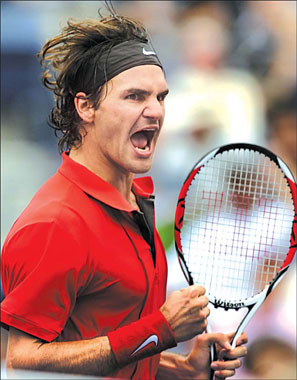Roger Federer has let his emotions get the best of him lately and the result is the Swiss star producing some of his best tennis of the year, pushing himself into the US Open final.
 |
|
Roger Federer of Switzerland wins the third set during his semifinal match against Novak Djokovic of Serbia at the US Open tennis tournament in New York on Saturday. Federer won 6-3, 5-7, 7-5, 6-2. [AFP] |
Second seed Federer reached his 17th Grand Slam final Saturday by defeating Novak Djokovic 6-3, 5-7, 7-5, 6-2 and awaits the winner of a rain-halted semifinal between top-ranked Spaniard Rafael Nadal and Britain's Andy Murray.
With Nadal having toppled him from the world number one ranking, blitzed him in the French Open final and beaten him in a five-set Wimbledon final thriller, Federer has found himself wearing his emotions on his sleeve.
"I had to show a lot of emotion," Federer said. "I'm trying to push myself, not to be more emotional but to play well.
"I've been struggling on hardcourt. I have no problem admitting that. Here it hasn't been a struggle. Maybe that's why I'm more emotional."
Federer even has cut loose with screams and shown an emotional flair on the court that was typically absent from his recent Grand Slam domination.
"Who knows? Maybe it's just a couple of weeks I'm going crazy and after that you will see me more relaxed again," Federer said.
"It's all about being myself on the court. I had a tough time just getting my act together on center court, trying to behave properly. When I got my act together and started to relax a little bit, results came, so I kept doing that.
"I've always tried to show emotions as much as I could without really disturbing my concentration. I've always been a very relaxed guy so this is not really too drastic of a change."
The drastic change has come in the rankings. After 237 weeks as number one, Federer surrendered the top spot to Nadal.
A run of 12 Grand Slam titles kept Federer focused with such intensity that emotion was more distracting than helpful, but with the spell now broken, Federer feels more free to be himself.
"I guess for a while I put my head down in the matches and just tried to keep that unbelievable run I had going instead of trying to disturb myself with any sort of reactions really," Federer said.
"Maybe it's a time where I can show a little bit more and it comes out. So for me it's not a big change because I practice more than I play matches. It's normal."
Winning an Olympic doubles gold medal with Stanislas Wawrinka at Beijing made Federer cry, but the joy of bringing glory to his homeland has filled something within Federer that Slam success could not.
"I'm in good spirits at the moment," Federer said. "The Olympic gold definitely helped me to, not be more happy on the court, but maybe more outgoing, because I'm always like this, especially in the practice."
But his aura of invincibility has been pierced and there is a sense that a host of younger rivals may have reached the point where his days at the top might be numbered.
"There's a lot at stake for him as far as not having won a major this season and losing the number one ranking," United States Davis Cup coach Patrick McEnroe said.
"I don't think he is quite playing at the level that he was in the last couple of years but he is certainly capable of turning it around.
"This event for him is big not just for this year and to win one major but as far as moving forward to next year and maybe his confidence in '09."
Federer finds no motivation in proving doubters wrong, even though only a hearty few are willing to declare him over the hill at 27.
"Some players get a kick out of that and want to prove people wrong. I'm not that type of person to go through life just wanting to prove myself. I'm past that point," Federer said.
"I think those days were five years ago. Didn't enjoy those times that much so I'm very happy I had a more relaxed five years where I could enjoy tennis and not really have to deal with tough situations."
(AFP via China Daily September 8, 2008)